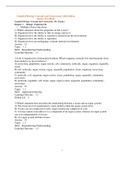Campbell Biology Concepts and Connections 10th Edition Taylor Test Bank Campbell Biology: Concepts and Connections, 10e (Taylor) Chapter 1 Biology: Exploring Life 1 1 ) Which statement about the properties of life is false ? A) Organisms have the ability to take in energy and use it. B) Organisms have the ability to respond to stimuli from the environment. C) Organisms have the ability to reproduce. D) Organisms have an unchanging, constant internal environment. Answer: D Topic: 1.1 Skill: Remembering/Understanding Learning Outcome: 1.1 2 ) Life is organized in a hierarchical fashion. Which sequence correctly lists that hierarchy from least inclusive to most inclusive? A) ecosystem, population, organ system, cell, community, molecule, organ, organism, organelle, tissue B) cell, molecule, organ system, organ, organelle, population, tissue, organism, ecosystem, community C) molecule, cell, organism, organ system, tissue, population, organ, organelle, community, ecosystem D) molecule, organelle, cell, tissue, organ, organ system, organism, population, community, ecosystem Answer: D Topic: 1.3 Skill: Applying/Analyzing Learning Outcome: 1.2 Global LO: 2 3 ) Which statement best describes the relationship between a tissue and an organ system? A) The tissue level of organization is more inclusive than the organ system level. B) Tissues are not composed of cells; organ systems are composed of cells. C) A tissue cannot exist unless it is a component of an organ system, whereas an organ system can exist independently of tissues. D) An organ system includes tissues. Answer: D Topic: 1.3 Skill: Remembering/Understanding Learning Outcome: 1.2 1 .1 Multiple Choice Questions Campbell Bi ology C oncepts and C onnections 10th Editi on Taylor Test Bank 4 ) The tree in your backyard is home to two crows, a colony of ants, a wasp's nest, two squirrels, and millions of bacteria. Together, all of these organisms represent a(n) A) species. B) community. C) population. D) ecosystem. Answer: B Topic: 1.3 Skill: Applying/Analyzing Learning Outcome: 1.2 Global LO: 2 5 ) A person who is eating a hamburger is mainly eating ground -up beef muscle. What levels of organization are represented in this ground -up muscle? A) organism, population, and community B) organ, organ system, and organism C) organelle, cell, and tissue D) tissue, organ, and organ system Answer: C Topic: 1.2 Skill: Applying/Analyzing Learning Outcome: 1.2 Global LO: 2 6 ) Which statement about ecosystems is false ? A) Bacteria and fungi recycle energy within an ecosystem. B) Pla nts and other photosynthetic organisms are producers in ecosystems. C) Chemical nutrients cycle within an ecosystem. D) In the process of energy conversions within an ecosystem, some energy is converted to heat. Answer: A Topic: 1.13 Skill: Remembering/Understanding Learning Outcome: 1.4 7 ) In an ecosystem, energy A) cycles along with chemical nutrients. B) is passed to producers by consumers. C) typically flows from producers to a series of consumers. D) comes ultimately from bacteria. Answer: C Topic: 1.3 Skill: Remembering/Understanding Learning Outcome: 1.4 2 8 ) Which statement about genetics is true? A) Genes are proteins that produce DNA. B) DNA is made up of six different kinds of nucleotides. C) Differences among organisms reflect different nucleotide sequences in their DNA. D) Each DNA molecule is a single strand of nucleotides. Answer: C Topic: 1.11 Skill: Remembering/Understanding Learning Outcome: 1.4 9 ) Which statement about bacteria is true? A) Archaea belong to the same domain. B) Bacteria do not use the same genetic code as organisms in other domains. C) All bacteria are multicellular organisms. D) Bacteria are in a domain of their own. Answer: D Topic: 1.2, 1.11 Skill: Remembering/Understanding Learning Outcome: 1.2 1 0) Members of the kingdom Animalia A) can obtain their food either by absorption or by photosynthesis. B) can obtain their food by eating other organisms. C) make their own food through photosynthesis. Answer: B Topic: 1.2 Skill: Remembering/Understanding Learning Outcome: 1.2 1 1) The kingdom Fungi includes species A) such as mushrooms and plants. B) that obtain food by ingesting whole organisms. C) that use photosynthesis to obtain food. D) that obtain food by decomposing dead organisms and absorbing the nutrients. Answer: D Topic: 1.6 Skill: Remembering/Understanding Learning Outcome: 1.5 1 2) Which group is within the domain Eukarya? A) Fungi B) Archaea C) Bacteria Answer: A Topic: 1.2 Skill: Remembering/Understanding Learning Outcome: 1.2 3 1 3) Organisms belonging to the kingdom Plantae A) are photosynthetic. B) obtain food by decomposing the remains of dead organisms and absorbing the nutrients. C) are unicellular. Answer: A Topic: 1.2 Skill: Remembering/Understanding Learning Outcome: 1.2 1 4) The teeth of grain -eating animals (such as horses) are usually broad and ridged. This makes the teeth suitable for grinding and chewing. Meat -eating animals (such as lions) have pointed teeth that are good for puncturing and ripping flesh. This illustrates A) a result of artificial selection by farmers. B) that animals always have the ability to develop the traits they need. C) a food web. D) a result of natural selection, which connects form and function. Answer: D Topic: 1.2 Skill: Applying/Analyzing Learning Outcome: 1.4 Global LO: 2 1 5) Which statement is not consistent with Darwin's theory of natural selection? A) Individuals in a population exhibit variations, some of which are passed from parents to offspring. B) Individual organisms experience genetic change during their life spans to better fit their environment. C) Factors in the environment result in some organisms having better reproductive success than others. D) Natural selection can lead to the appearance of new species. Answer: B Topic: 1.10 Skill: Remembering/Understanding Learning Outcome: 1.4 1 6) An antibiotic kills 99.9% of a bacterial population. You would expect the next generation of bacteria to be A) just as susceptible to that antibiotic as was the previous generation. B) more resistant to that antibiotic than the previous generation. C) more contagious than the previous generation. Answer: B Topic: 1.10 Skill: Applying/Analyzing Learning Outcome: 1.4 Global LO: 2, 5 4




